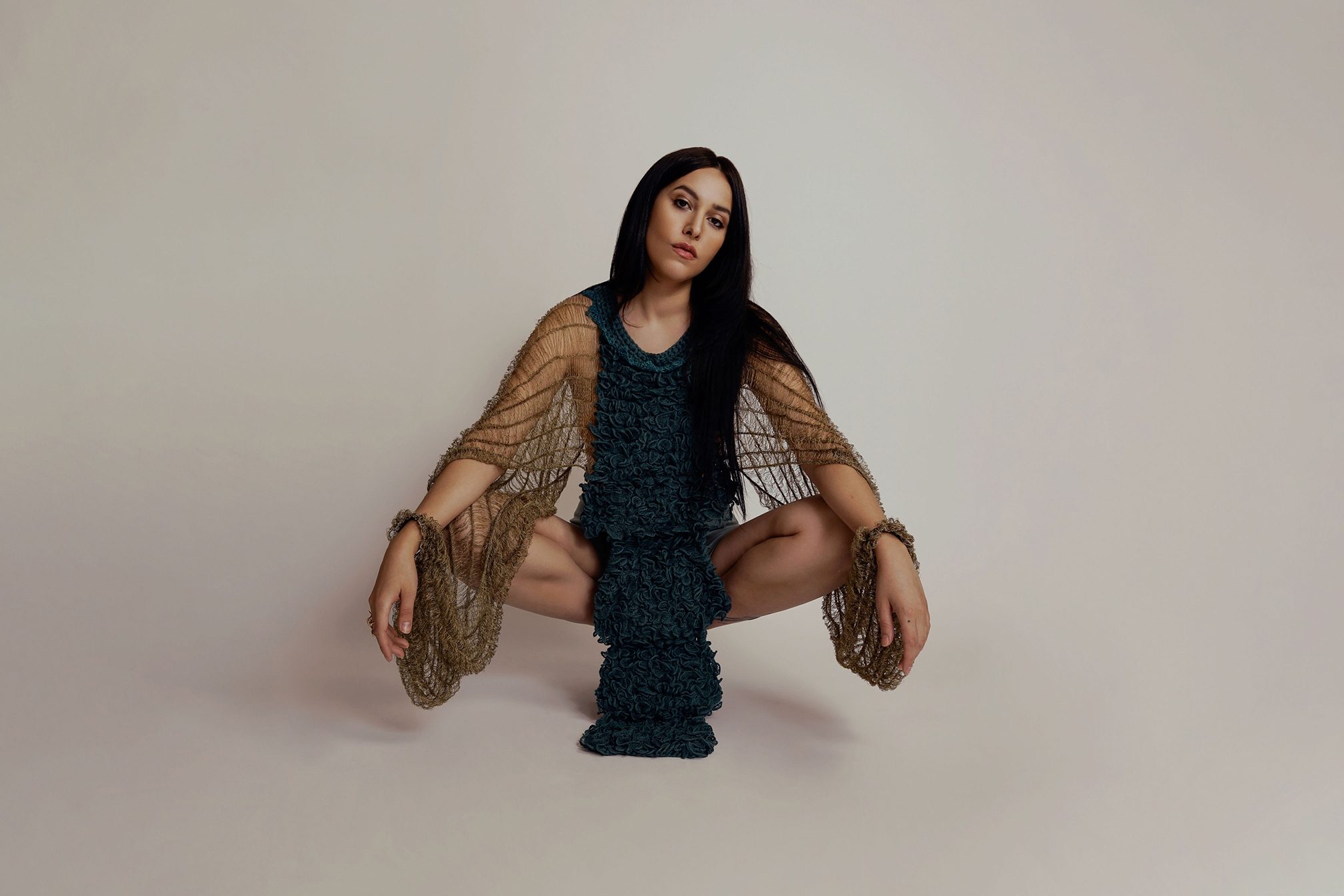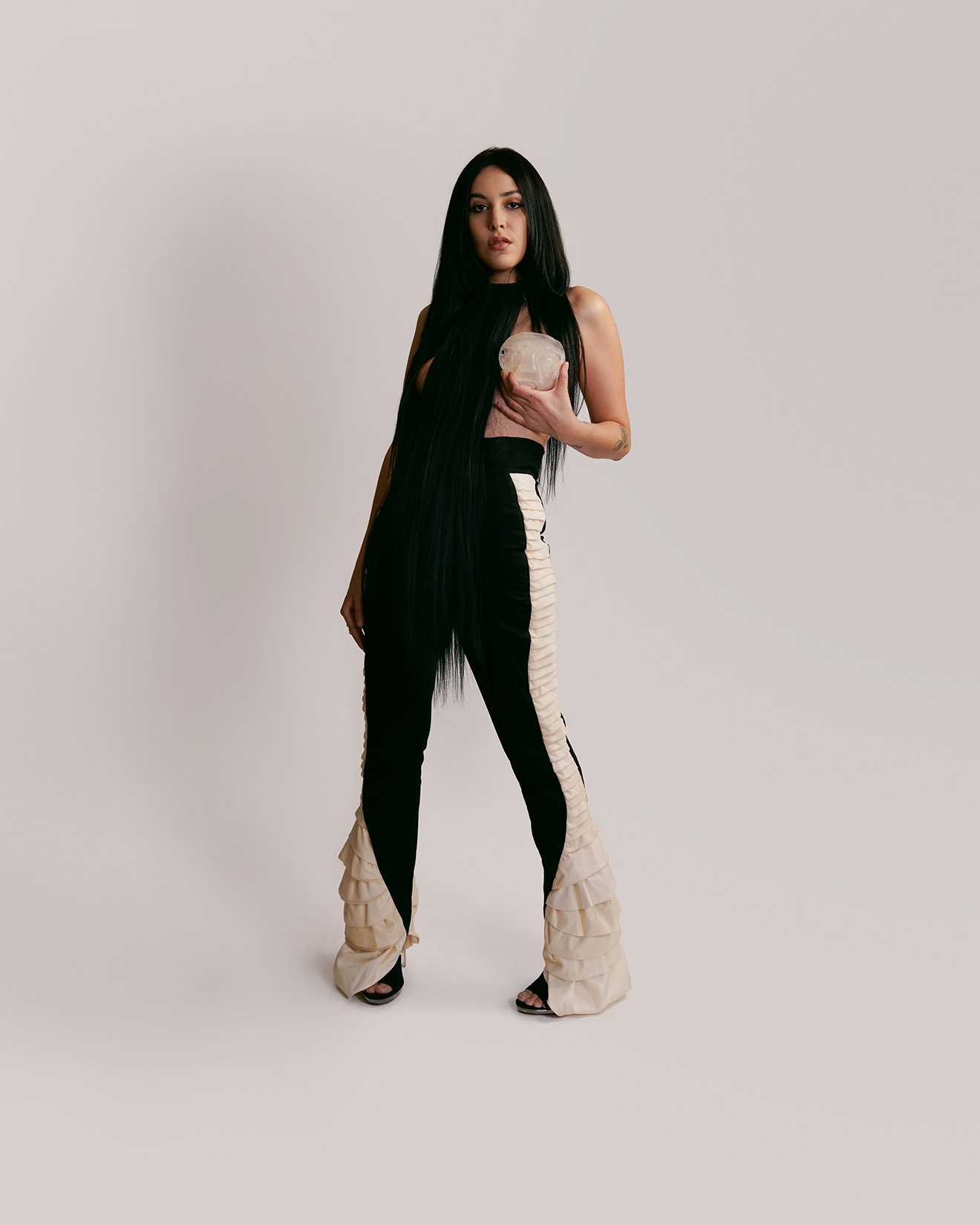 Features
Features
Cyclic Revolution: Debit’s radical new album reconstructs Mayan musical history
Martyn Pepperell speaks to Mexican-American artist Debit about indigenous resistance, revolutionary art and the path to her new album 'The Long Count'
In the late 2000s, the Mexican-American producer, DJ, and audio engineer Delia Beatriz aka Debit, divided her time between Providence, Rhode Island, where she was studying at Brown University, and Chiapas, Mexico's southernmost state. There, she spent her days within Mayan communities, building solidarity with The Zapatista Army of National Liberation, a decentralised indigenous resistance group.
Delia’s experiences in Chiapas were a pivotal precursor to her new album, 'The Long Count'. “I went there to become involved with the movement,” she explains. “It was the first time I’d lived in an Indigenous context. I experienced a paradigm shift where I realised there are different systems of information, epistemologies, rhythms and notions of harmony and tone.”
Named after the ancient Mesoamerican Long Count calendar, 'The Long Count' is an unsettlingly beautiful fever dream of ceremonial Mayan wind instruments, digitised datasets, machine learning, and sound sculpture reconstructions. Simultaneously reaching into the far-flung past and a technonaturalistic future, it's an intoxicating mélange of historical reflection and speculative futurism. Unnerving, calming, and impossible to ignore.
Read this next: Mexico City's EXT party is inclusive, innovative and inexpensive
Delia was born into a family of scientific thinkers in Monterrey, an industrial city with a rich history in Mexico's modern musical landscape. They lived a middle-class life, but as Delia and her older brother entered their early teens, their parents wanted more for them. Despite being unable to speak English herself, their mother took them across the border to Indianapolis in the American Midwest. They migrated in pursuit of economic opportunity, with their father following later.
“Indianapolis was fascinating socially because there was so much diversity compared to Monterrey,” Delia reflects. During her middle school years, she started listening to commercial hip hop, befriended Bosnian refugees, and began to learn about the inequality and discrimination that existed in different forms worldwide. “That was what radicalised me,” she says.
Two years later, her family moved to Laredo, Texas, a border town with a majority Hispanic population. “In Indianapolis, we were an ethnic minority,” Delia explains. “Living in Laredo made me, as a Mexican American, feel like I could do anything because I could see every profession represented.” In Laredo, her hip hop tastes turned towards Cash Money Records and the low-slung productions of Mannie Fresh. “One of the highlights of my life was getting on stage and dancing with him at a concert,” she enthuses. She also remembers Laredo as where she was first exposed to experimental rock and the idea of musical subcultures.
Read this next: "A tool for protest": DJs from the Global South are fighting oppression with music
After high school, Delia headed to Providence on a full scholarship to complete a liberal arts degree in International Relations and Latin American Studies at Brown University. “I’d tell people I wanted to be an ambassador and solve class war, but really, I wanted to be a revolutionary,” she explains. Outside of her majors, she took extracurricular classes in computer music, digital art and electronic literature, hosted a college radio show, explored the local noise and punk scenes, and went on trips to Zapatista communities in Chiapas.
Through her extracurricular studies, Delia found a creative pocket as a multimedia artist. Seminal internet art pieces like My Boyfriend Came Back From the War by Olia Lialina profoundly affected her, as did the artists she met in D.I.Y spaces like AS220, Building 16 and Castlevania. “I had a very limited idea of what radical meant, which was hippie leftist,” she says. “The union of my new and old experiences became very important to me.”

Multimedia art sat in the foreground for Delia, but she was quietly developing her skills as an electronic music producer. Inspired by early electronic music composers like Delia Derbyshire and the blunted experimentation of Tricky’s 'Maxinquaye', she wrote structureless computer music in the quiet hours. “At first, I was very timid about it,” she reflects. That all began to change when Delia followed her best friend to Buenos Aires after graduating.
In Argentina she became involved in FM La Tribu, a left-wing experimental radio station and culture collective operating out of a large shared house. There she participated in circuit-bending workshops, dug into South America’s electronic music traditions and began to think about building bespoke instruments. “It was the time of my life,” she enthuses. “We were dumpster diving for food and going to shows every night.”
Read this next: Radio Alhara: the online radio station connecting the Arab world
In Buenos Aires, she reconnected with a friend she’d made in Chiapas through La Otra Campaña (The Other Campaign), a Zapatista organised political program advocating for recognition and protection of indigenous rights and autonomy in Mexico. He introduced her to a group of radical leftist Mexican expatriates. “We’d have meetings and talk about our ideas,” she remembers.
After eight months, Delia crossed the border to Santiago, Chile. She joined a socialist experiment where digital artists built a virtual community on the online multimedia platform Second Life. Inside the matrix, she met Hector Llanquín, the Chilean multimedia artist and musician who became her collaborator in the industrial EBM duo HDXD.
Delia and Hector moved to Monterrey, Mexico, where they fell in with the experimental music scene. In 2013, they released the 'DEMOTICON' EP through MALIGNA, a Mexico City cassette label. “MALIGNA came out of a blog called Negative Youth, who was the cultural vanguard of the country,” Delia explains. “They were putting on witch house shows, and they put us on as well. For HDXD, she gave herself one rule: no computers. This was a hardware-only exercise.
In Monterrey, Hector started doing artwork for the then-nascent Mexican club music collective N.A.A.F.I. Delia and Hector operated outside of a nightclub context, but as they watched N.A.A.F.I find a throughline between regggaeton, dembow, tribal guarachero, kuduro, industrial and deconstructed club, her stance shifted. “I realised what they were doing was quite innovative,” she says. It was a link that proved fortunate for her later on.
Read this next: NAAFI: Bass without borders
However, as time passed, Delia started to understand why her family had originally left Mexico. “I felt really precarious economically,” she admits. “It was like I had no other vocation or possibility outside of working in culture.” Her brother was in New York. By 2015, she had followed him there.
Between her experiences in the US, Mexico and South America, Delia came to a moment of clarity in New York. “I realized that culture and music is the precondition to politics,” she explains. If she couldn’t change the politics, maybe she could create music that would help shape a different set of preconditions. Amid a period of personal upheaval, she taught herself how to DJ, and for the first time in her life, fully embraced music as her pathway.
“I think it took my life falling apart to create the momentum that catapulted me into radical self-commitment,” she admits. Quickly, DJing began to inform her music productions, which she would share with N.A.A.F.I. “I don’t think I fully understood music until I started DJing,” she says. “In the past, I’d been radical by not wanting to use structure, but I thought, why don’t you get radical within the structure.”
N.A.A.F.I was impressed and she started playing with them at shows. “Tayhana and Lao [from N.A.A.F.I], your jaw drops when you see them play, because they’re so bold, you know?” Delia continues. “They made me want to get really technical, but when I think about it, what DJing really taught me is that music is a vibe.” Within two years, she’d made her way onto the summer line-up at the storied daytime summer Warm Up series at MoMA PS1 in Queens, where I saw her turn out the dancefloor in September 2017.
Read this next: No more 4x4: How sounds from the Global South stopped club culture stagnating
Five months later, N.A.A.F.I released her debut album, 'Animus'. It was an infinity loop wrapped around two poles: the experimental noise and ambient she’d been exploring since her Providence days and her DJ sets, stripped-down mutant club music with a dembow lilt. The title came from the book Women Who Run with the Wolves by the psychoanalyst Clarissa Pinkola Estés. Clarissa explored Carl Jung’s concept of animus as an inner masculine part of the female personality, providing Delia with a framework to contrast ambient with club music. “I think it put me on the map musically,” she reflects. "The reception around that album was epic. I popped the fuck off. Right after 'Animus' came out, I was fully booked, fully living off music."

Since then, she has oscillated between those two poles, beginning later in 2018 with 'Love Discipline', an ambient EP inspired by the writings of German psychoanalyst Erich Fromm. Erich understood love as a discipline, and she interpreted his thinking in a series of sweeping, cinematic pieces. “Ambient brings out something in me that I will never fully understand,” she says. The New York label Quiet Time released it as a limited edition cassette, which promptly sold out.
Read this next: Ambient music has become a soothing soundtrack to turbulent
During the summer of that year, she began a Masters in Music Technology at NYU, focusing on audio engineering and programming. “I primarily went back to school to learn how to mix and master, but also to diversify what I could do within music at large,” she explains. The thinking space and skillsets studying afforded her were crucial to what was to follow.
Ever since she was a child, Delia had been fascinated by pre-colonial history, particularly the Mayan empire. While at NYU, she read a Tzotzil language book and found herself rethinking everything. That experience laid the foundations for the 'System' EP, released through N.A.A.F.I in June 2019. “I took the concepts of a language book, how you built a language and used them to build a world,” she says.
'System''s bedrock was tribal guarachero, a Northern Mexican club music style born from cumbia, electro house and the afterglow of emo. “I wanted to work with the material, but remake it from my point of view, which was the post-industrial and techno scenes in New York,” she explains. Deconstruction was over; it was time for reconstruction. Disregarding the genre’s dayglo synthesisers and folkloric samples, she dialled up its triplet-driven beats. 'System' was all lean muscle, and the results were sensational on the dancefloor.
While taking classes with the legendary New York electronic music pioneer Morton Subotnick, Delia started looking into machine learning and AI in music. She quickly noticed gaps around non-Western music and sonic archeology. From there, her Mayan interests led her to the Mayan Studies Institute at the Universidad Nacional Autónoma de México, which maintains a library of Mayan wind instrument recordings – whistles, ocarinas, flutes and trumpets. They became the basis of her second album, 'The Long Count', which followed 'System' in being act of reconstruction.
“I had to manually splice up the recordings into the smallest units of information to create a dataset, which took about a month,” she says. Once that was complete, she used a Music Information Retrieval algorithm called CREPE to process the dataset. “It spewed out the frequencies and allowed me to see the colour palette of the tones,” she continues. Delia used that information to program the virtual instruments she composed 'The Long Count' with. Unexpectedly, her instrument-building dreams had come true.
Read this next: Algorave: The live coding movement that makes next-level electronic music
Last year, club music came calling again when Delia was approached to DJ for the 21st-century rap iconoclast, Azealia Banks. “It’s something that has profoundly impacted me,” she explains. “Azealia is an illuminating creative force, and she operates on a whole other level. The energy at the shows has been amazing.”
Although she describes herself, with a hint of frustration, as a “late bloomer”, the depth and breadth of Delia’s experiences have positioned her to do remarkable things. Over the last seven months, she’s balanced DJing for Azealia with writing music for the Mexican fashion brand Barragán, creating a sample pack for Splice, vocal engineering, research work, and a cross-cultural sound design project with Uruguayan producer Lechuga Zafiro. In May, Delia will tour America with her Modern Love labelmate Andy Stott. Her long count cycle is far from over.
Debit’s The Long Count album is out now via Modern Love, get it here. Follow her on Twitter and Instagram
Martyn Pepperell is a freelance journalist, follow him on Twitter


